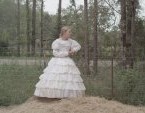Film Fest Night 2: Stop the Pounding Heart
 Last night was night #2 of the Duluth Superior Film Fest, and I made an evening of it.
Last night was night #2 of the Duluth Superior Film Fest, and I made an evening of it.
I enjoyed some time at the Zeitgeist beforehand, reading Of Dice and Men while enjoying the fact that members of Whole Foods get a discount on their first drink, something that, had I paid attention, would have saved me enough money over the past year to have paid for my Whole Foods membership.
Then, downstairs to see Stop the Pounding Heart. From another person’s review of the movie, as shown at Cannes:
A hybrid of documentary and unscripted narrative depicting real people in an insular rural community, the film’s cast is made up primarily of members of two large families. The chief focus is the Carlsons, goat farmers who run an artisanal dairy business, selling milk, cheese and yoghurt at local farmers’ markets.
The parents, Leeanne and Tim, raise their twelve children according to a strict interpretation of the Bible, homeschooling them to limit negative influences. It’s an austere life of prayer, work and religious studies at mealtime, with no sign in the house of such standard communication tools as television, computers or telephones.
For myself, I found the movie challenging — as I do nearly everything brought to town by the DSFF’s Explorer’s Club (the same series that brought us Othello on Tuesday). At moments, the style was so visual, it almost hurt to watch. (I’m a dialogue guy, I guess.) But this is why I appreciate what the DSFF and the Explorer’s Club bring to this community: things I would never even know to experience without them. Every once in a while, I want to shake the organizers (chief among them, Richard Hansen, who is on my list of 25 people who make Duluth a better place to live.
What is better than a movie, though, is the talk afterward. My friend and I stopped across the street at Blackwater, for the half-off sushi on Thursdays.
Once there, I (perhaps foolishly) announced that a movie about fundamentalist Texas, where people shoot guns recreationally, where women are taught that, as per the Bible, it shows more strength to submit to a man than it does to claim independence and autonomy, where a good afternoon is spent strapping yourself to the top of an animal (that does not want you on its back and bucks wildly to remove you) and injuring yourself as you fall off, where a woman gives birth in a kiddie swimming pool on the concrete floor of the house where she lives … feels like an exercise in anthropology.
My companion, on the other hand, swore that the same movie could have been filmed in the rural Minnesota area he grew up in, minus the bull riding, of course.
In that moment, we discovered so much about the differences in our own experiences and in what it means to grow up poor in urban and rural settings. Maybe that’s what good film does — it opens a window onto somewhere else and in so doing, it opens a window onto ourselves, too.
Leave a Comment
Only registered members can post a comment , Login / Register Here









No Comments